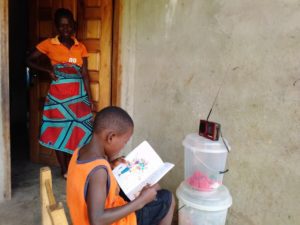Around the world, the COVID-19 pandemic is causing global disruption to schools and learning. In 2020, across 185 countries, an estimated 1.7 billion children and youth were unable to attend school. Now in 2021, some schools are reopening but COVID-19 is gaining more ground and, with new variants emerging, the ability for schools to stay open is under a renewed threat. Schools remain closed in many places with no planned return date.
There are many lessons for those in the international cooperation sector when it comes to COVID-19 and education, but two things are clear: the global pandemic has shed light on existing educational inequalities, and those disadvantaged by poverty and marginalization are being left further behind.
To ensure student learning continues, CODE and Farm Radio International (FRI) joined forces to help support children and families in Liberia and Sierra Leone stay engaged, involved, and learning at home. It is paramount for children to continue their education and in the circumstances one of the best ways to do this is to ensure they have access to interesting and relatable, locally published children’s books and have qualified teachers to guide their interaction with the text. Building the love and habit of reading remains key to their success as less than 50 per cent of Liberian and Sierra Leonean adults are fully literate.
CODE’s 60-year history as an international development organization focused uniquely on literacy and education and FRI’s 40-year track record of using radio as a powerful and technologically appropriate force for distance learning, has made it possible to deliver, at scale, a daily educational opportunity that brought great books and great teachers hundreds of thousands of learners isolated at home.
 Working with local writers and partners in Liberia and Sierra Leone, CODE had already helped develop national capacity to produce amazing children’s books, ones filled with captivating stories that complement national curriculum and reflect the children’s lived realities. The stories also contain needed informational text emphasizing everything from nutrition to handwashing, and gender equality to local folklore. The stories were consolidated and published as an anthology that was distributed to thousands of households across both countries.
Working with local writers and partners in Liberia and Sierra Leone, CODE had already helped develop national capacity to produce amazing children’s books, ones filled with captivating stories that complement national curriculum and reflect the children’s lived realities. The stories also contain needed informational text emphasizing everything from nutrition to handwashing, and gender equality to local folklore. The stories were consolidated and published as an anthology that was distributed to thousands of households across both countries.
FRI brought in local radio stations to set up daily shows with “Radio Reading Teachers” who take listeners on an educational journey guided by a comprehensive script and readings from the anthologies. Activities include a word of the day, story time and a component to help parents support their children with literacy learning. A call-in segment adds an interactive element to the programs, allowing listeners to demonstrate their comprehension levels and engage with the teacher. Students can call in and leave questions, or answer polls that track their learning, even on the most basic mobile phone. As the programs are produced, those involved in their creation receive comments and suggestions which can then be fed back to improve the listeners’ experience.
The project has harnessed the expertise of the local Ministries of Education and in-country literacy partners such as The Association of Language and Literacy Educators of Sierra Leone and the WE-CARE Library Foundation of Liberia. Timely financial support was made possible by Global Affairs Canada, motivated by the project’s objective of ensuring access to quality education as a pathway to opportunity and greater gender equality and empowerment.
It is important to stress in the design of the program that many students in Africa do not have access to the internet or digital devices. The United Nations estimates that remote learning in any form remains out of reach for at least 500 million students worldwide. Yet radio remains inexpensive and accessible, with most families having access to a set.
While the programs aim to reach all listeners, there is a particular emphasis on teaching girls stuck at home, who were already struggling to access education pre-pandemic. They face additional economic hardships and are exposed to more abuse and violence than their male counterparts, especially in isolation at home, as was sadly demonstrated during Ebola-related school closures in both countries in 2014. Many girls simply did not return to school and completion rates declined. As it stands, more boys than girls reach secondary school. Radio Reading Teachers, and the books they read, could reach girls and boys over the airwaves, in their homes.
Innovation does not just have to be high tech. Supporting success through a combination of well thought out programming, appropriate technology and strong partnerships is the key to success for making education at a distance feasible. Now, more than ever, Canada must continue to ensure that students are not left behind.


